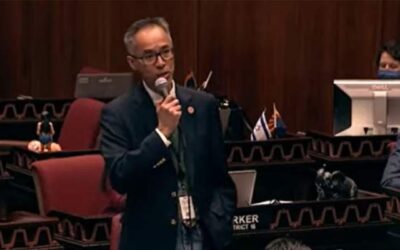By Corinne Murdock |
A controversial bill to offer up to $150 million in tax credits to filmmakers, SB1708, passed the House Appropriations Committee on a divided vote: 8-5.
The bill reads like a promotional deal for a store: if a company spends up to $10 million, then they get 15 percent in tax credits. If they spend between $10 and $35 million, then they get $17.5 percent. And if they spend over $35 million, then they get 20 percent. Companies could get more: an additional 2.5 percent for total production labor costs associated with Arizonan employees, an additional 2.5 percent of total qualified production costs associated with filming at a qualified production facility in Arizona or primarily on location, and an additional 2.5 percent of total qualified production costs if they filmed in association with a long-term tenant of a qualified production facility.
Arizona Free Enterprise Club Vice President Aimee Yentes told the committee that the $150 million refundable tax credit was not only unwise but likely unconstitutional, directing the committee members to review the Goldwater Institute’s analysis of the bill’s potential gift clause violations. She added that this type of legislation only causes a bidding war between states that ultimately cause its residents to lose out, citing similar legislation adopted in other states and their current struggles. As for the argument that the tax credit would result in more jobs for locals, Yentes asserted that theory fails to prove itself in practice.
“It’s a loser that produces few, shallow, low-payment, temporary jobs,” said Yentes.
Michael Scott, CEO of self-described “faith-based” film company Pure Flix responsible for movies like “Case for Christ” and the “God’s Not Dead” series, said that they spend tens of millions outside of Arizona. Scott promised they would employ many locals if they could bring filmmaking to Arizona.
Rob Gerstner, a longtime cameraman, said that this bill wouldn’t stop film companies from “sub-renting” equipment: local companies lack all the equipment necessary to film a movie, meaning that they would then need to rely on renting equipment from other states to fulfill the film company’s contract. Gerstner said that money would bleed out of Arizona because of logistical problems like that.
State Representative Jake Hoffman (R-Queen Creek) noted that pornography movies don’t qualify for the credit, but asked why works like the controversial Netflix film “Cuties” wouldn’t be scrutinized — something that would oppose certain Arizonan’s values. The bill sponsor, State Senator David Gowan (R-Sierra Vista), said that the bill would inspire the “mass good” and that the bad and good works could compete.
“I don’t know how you control all that aspect, but it certainly allows them to be here and allow them to counter that with our religious movies,” said Gowan. “You can’t control everything that’s out there, but you can certainly control the most evil.”
Hoffman said that political candidates and their campaigns could reap the tax credit reward. Gowan said that those kinds of works would fall under campaign laws, which would. Hoffman said that attorneys informed him of the opposite legal take and advised Gowan to look into that.
State Representative Gail Griffin (R-Hereford) explained that she’s never voted for a refundable tax credit. Hoffman said that he wasn’t confident political campaigns wouldn’t benefit from the bill, and cited concerns that the bill would cause a slippery slope “race to the bottom” for tax credits. State Representative Joanne Osborne (R-Goodyear) cited similar concerns.
“At the end of the day I’m just a small mom and pop business owner; I don’t get a $150 million tax credit,” said Osborne. “This bill does set a precedent, and it’s not one I’m going to support.”
State Representative Lorenzo Sierra (D-Avondale) expressed excitement at the thought of all the film-related programs that may arise from this bill.
Butler argued that this bill was “really scary” from the sheer amount of money being committed from the state legislature, at the potential expense of other investments. She said she wasn’t convinced that the returns would outweigh the funds given, citing that there needed to be more checks and balances like a sunset clause to keep the legislation in check. Yet, Butler voted for the bill.
Chairman Regina Cobb (R-Kingman) said that she felt there were significant advantages and disadvantages presented by the bill, agreeing with Butler that there should be a sunset clause, and voted for the bill.
Corinne Murdock is a reporter for AZ Free News. Follow her latest on Twitter, or email tips to corinne@azfreenews.com.








